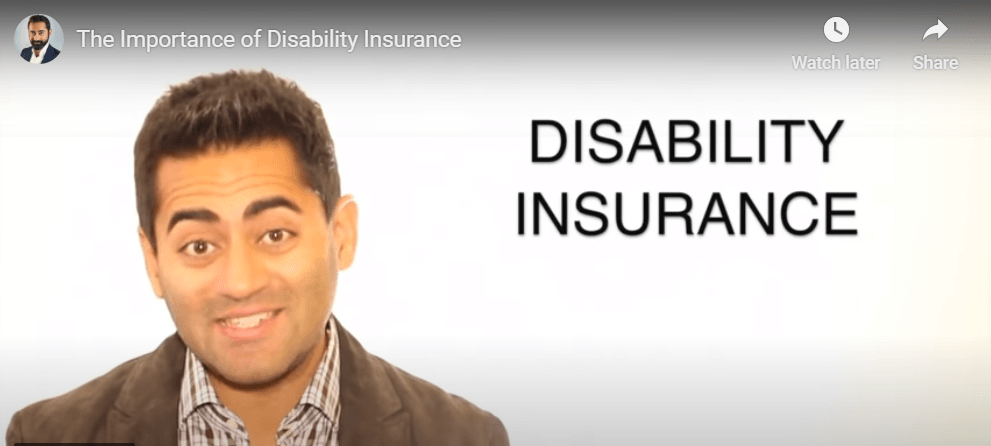The Importance of Disability Insurance
It took a journey back into the archives to find this little beauty of a video by Canadian finance expert Preet Banerjee.
Before giving Ted Talks, or appearing regularly on CBC Marketplace, or any of the other countless things Preet has done, he had some smart things to say about disability insurance. Certainly worth a watch!
If you are in the process of buying a home and/or thinking about protecting yourself, feel free to contact me anytime! I will make sure you are well taken care of.
Transcript
Hi everyone, my name is Preet Banerjee, and today we’re going to talk about disability insurance. But before we get started, I wanted to share some other feedback that I received from the first video blog entry. Essentially I was told, do not wear just a black t-shirt, do not call it Mostly Money Mostly Canadian, and try not to be such a tight ass.
Okay, so what’s the deal with disability insurance? You insure your house, you insure your car, and might even injure every single out electronic gadget that you own. But what about your single biggest asset; your ability to earning income for the rest of your life.
Let’s put that into context: Assume a university graduate starts their working career earning forty five thousand dollars per year, assuming raises and promotions over time, perhaps their salary grows by 4% per year. Over 40 year career, that translates into over 4.25 million dollars. Overtime part of that is slowly converted into tangible assets and investments. While you are younger your future potential earnings is your biggest asset. How well-protected is that asset?
For example, life insurance protects your family’s lifestyle if you die. Clearly your income stops but a lump sum death benefit is there to provide for your family. When you die, you don’t want your spouse or the rest of your family to be burdened unnecessarily if you can avoid it. So perhaps, that lump sum benefit can be used to pay off the mortgage, help with the bills that need to be paid, maybe it’s for education for the kids. But what happens if you don’t die? What happens if you become sick or injured and don’t have an income anymore? Your family is not going to get that life insurance lump-sum death benefit and remember to collect that lump sum death benefit you have to be dead, so that’s off the table. You’re alive, you’re just unable to work, what do you do?
Unfortunately the sad realization for many families is, they might have been better off if they had indeed died. Because they’re still alive but they don’t have an income and they still have all those bills to pay. The mortgage still needs to be paid, other bills around the house all still need to be paid, and quite frankly depending on your injury or sickness you might need to afford special assistant devices. What could end up happening is a downsizing of your lifestyle, or quite frankly you can go broke.
According to Canada Life you have a 1 in 3 chance at becoming disabled for more than 90 days before the age of 65 and the average length disability that last more than 90 days is 2.9 years.
Ask yourself this question: Could your finances survive 2.9 years of no income? Now if you have a benefit plan at work that provides for disability insurance coverage, make sure that you take a look at that book and see exactly what that coverage is. Some benefit plans only pay for five years, others pay until you turn 65. The percentage of income that’s replaced also varies, so dig out that employee handbook and look it up and see how much coverage you actually have. If you find that you don’t have enough or as much as you would like, talk to an insurance agent. They can create a pop-up plan that would piggyback onto your existing coverage. And if you have no disability insurance whatsoever, run (safely) don’t walk to your insurance agent to talk about what your options are.
Simply talking to an insurance agent doesn’t mean you have to sign up for a policy but I promise you one of the biggest mistake people make is not having disability insurance coverage.
Now, you should be prepared for some sticker shock, disability insurance policy’s don’t tend to be the cheapest insurance policies but remember the asset that you’re protecting is potentially one is your single biggest asset, so it would only make sense that it would cost more. a typical insurance policy for disability coverage might be a hundred dollars a month, it could be a little bit less and could be substantially more. It really depends on the type of work you do, and your health situation as well as other factors that you’re agent can talk to you about. Remember, always seek the advice of a qualified professional for your own situation. These are just general tips to bring you up to speed on that very basics.
Well that’s it for this video, I hope you have a better understanding now of disability insurance coverage. My name’s Preet Banerjee, don’t forget to subscribe to my YouTube channel for more money tips.
Katherine Martin
Origin Mortgages
Phone: 1-604-454-0843
Email: kmartin@planmymortgage.ca
Fax: 1-604-454-0842
RECENT POSTS






